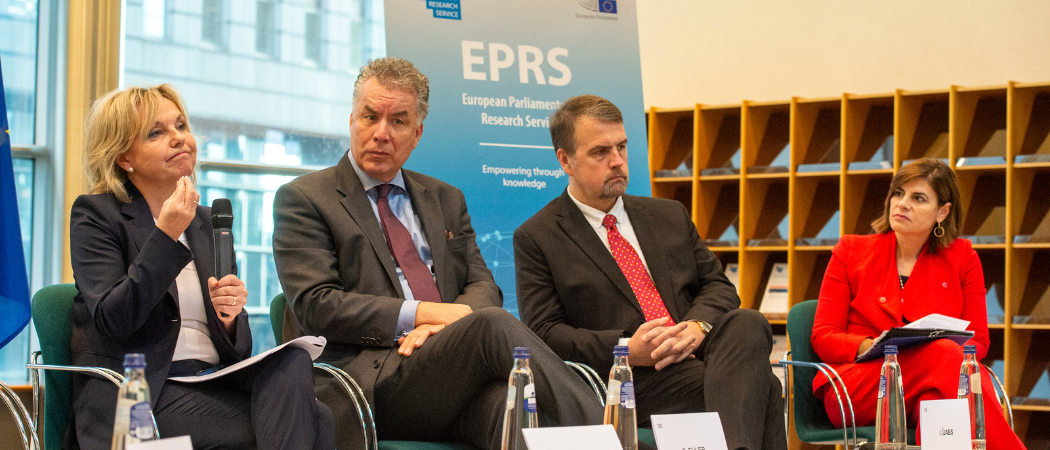Parliament’s push for better protection at an EU level gathers pace as MEP resolution gears up for final vote in plenary

From left to right: Sabine Döring, state secretary of Germany's Federal Ministry of Education and Research; Christian Ehler, MEP and STOA chair; Ivars Ījabs, MEP and STOA vice-chair; Anna Panagopoulou, director of ERA and innovation at the European Commission’s Directorate General for Research and Innovation. Photo: Eric Vidal / European Union.
The European Parliament’s call for EU legislation on scientific freedom is a vote away from adoption, after the research, industry and energy committee ITRE, gave its backing to the report this week.
This will give impetus to further EU action on protecting academic freedom, which the Commission is now mulling over. “We are considering very, very seriously the elements provided in the position of the Parliament and [are] looking forward to cooperating with you on that matter,” EU research commissioner Iliana Ivanova told MEPs.
Ivanova gave a speech at the second annual conference on scientific freedom organised by the Parliament’s STOA panel for the future of science and technology on Wednesday, a day after the vote.
At the conference, leading research policymakers discussed how to better protect scientific freedom, which experts say is eroding in Europe. This year’s update to the Academic Freedom Index singled out the deterioration in academic freedom in Poland and Hungary, and pointed to significant declines in the UK and US.
The first item on the to do list for EU member states is to set up a monitoring system, which has been in the works since 2020. Germany’s state secretary of the education and research ministry Sabine Döring made it clear this is a priority, and emphasised it requires a sharpened concept of academic freedom, as being different from the freedom of expression. “Germany is supporting the EU Commission in the development of this tool,” said Döring.
But this is likely to be only the beginning, as it becomes clear that political declarations may not be enough to reverse the trend. “Just focusing on emphasising academic freedom seems to not be sufficient,” said Döring. “We try to leave it at the autonomy of academic institutions while on the other hand being there to have discussions, give recommendations and so on. But I have not made up my mind whether this will suffice in the end.”
Thus far, EU policymakers have largely focused on limiting foreign interference, as fears over espionage from China and other countries mount. Last year, the Commission published a guidebook for national research organisations and universities on how to deal with foreign interference.
But Anna Panagopoulou, director at the Commission’s research directorate, acknowledged there are internal risks too, as democratic values are challenged in EU member states. “We do need to look at it, it’s one of the activities we are doing,” she assured MEPs.
For Christian Ehler MEP, the main voice behind the Parliament’s push for action, the ultimate goal is EU legislation on scientific freedom, as demanded by the upcoming resolution.
As things stand, no formal rules exist. When Hungary forced the Central European University out of the country in 2017, the European Court of Justice ruled the move was illegal based on World Trade Organisation regulations. Ehler says a dedicated rulebook for scientific freedom is needed.
“From my perspective, we have to change the treaties,” said Ehler. “We start now with something realistic, but I think we have to go deeper.”
The Parliament report doesn’t oblige the Commission to put forward a proposal for legislation, but at the start of her term, Commission president Ursula von der Leyen reportedly promised the Parliament that if there is a request, the Commission would table a proposal.
Panagopoulou said on Wednesday the Commission has not yet decided how it will follow up on the Parliament’s upcoming report.





 A unique international forum for public research organisations and companies to connect their external engagement with strategic interests around their R&D system.
A unique international forum for public research organisations and companies to connect their external engagement with strategic interests around their R&D system.